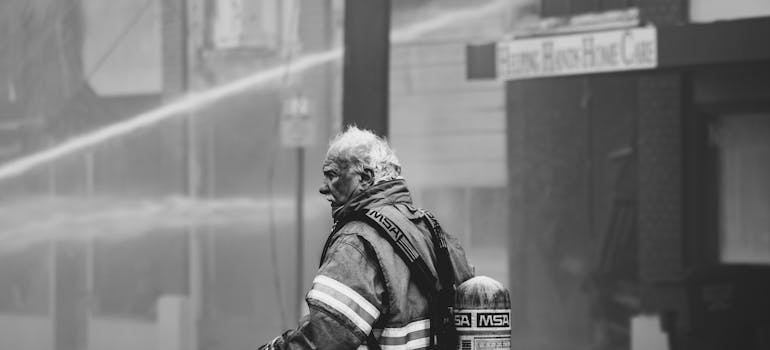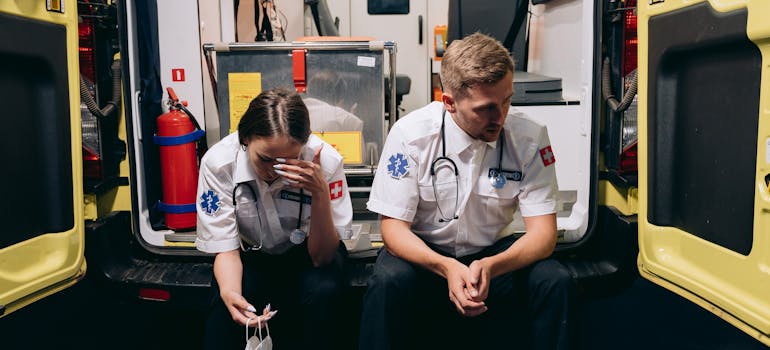First responders tackle some of the toughest jobs out there, and the pressure can sometimes lead to addiction. This is a real challenge that needs open discussion and practical solutions. If you or your loved one needs help, rehab centers in West Virginia are here to assist. They provide specialized support designed just for first responders, helping them handle both the physical and emotional sides of recovery. It’s about getting them the help they need to regain control and continue being the heroes we rely on every day in our communities.
Mental Disorders Often Faced by First Responders
First responders are often hailed as heroes, stepping into dangerous and distressing situations without hesitation. Yet, the very nature of their duties—constantly facing life-threatening scenarios, making life-or-death decisions, and dealing with the aftermath of disasters—places them at high risk for various mental health disorders. The stress doesn’t just fade away when the emergency does – it accumulates, affecting their mental health over time.

Among the most common mental disorders that first responders experience are:
- Post-traumatic stress disorder (PTSD)
- Depression
- Anxiety disorders
- Substance use disorders (SUDs)
PTSD Among First Responders
It’s no secret that first responders are at high risk for PTSD. Research indicates that up to 30 percent of first responders suffer from this condition, and about 20 percent of those with PTSD may also struggle with a co-occurring substance use disorder. Every day, first responders are called upon to handle situations that are beyond the ordinary—extremely graphic and traumatic scenes that can challenge even the most seasoned professionals. Despite their composed exterior, the weight of these events can be profoundly draining, often leading to sleepless nights or seeking comfort in unhealthy ways, such as alcohol.
PTSD manifests in several ways, and recognizing the symptoms is key to seeking timely help. Common signs include:
- Flashbacks and nightmares about the traumatic events
- Severe anxiety and hyper-vigilance
- Mood swings and irritability
- Feelings of guilt, shame, or self-blame
- Difficulty concentrating and memory problems
Given these challenges, innovative treatments such as art therapy rehabilitation are becoming more popular. Art therapy offers a creative outlet for expression and processing difficult emotions, providing first responders a non-verbal way to articulate their experiences and begin healing. This form of therapy can be a powerful component of a comprehensive treatment plan, helping to address the emotional and psychological needs that traditional methods might miss.
Depression Among First Responders
Depression hits hard among first responders, far more than many of us realize. About 30 percent of first responders develop conditions like depression, much higher than the 20 percent seen in the general population. Their job stress and the traumatic scenes they witness take a hefty toll. What’s more, almost 70 percent say they don’t get enough downtime to recover from one harrowing incident before facing another. This constant exposure can lead to clinical depression in 7 percent of first responders. Shockingly, the thought of suicide is also much more common among this group, with 37 percent of fire and EMS workers considering it at some point—a rate 10 times higher than the national average.

Here are a few symptoms of depression to watch for:
- Persistent sadness or low mood
- Loss of interest in activities once enjoyed
- Changes in appetite or weight
- Sleep disturbances
- Fatigue or loss of energy
Anxiety Disorders Among First Responders
Anxiety is another significant challenge that first responders face, with about 13.5% reporting symptoms. Imagine having to maintain composure and make split-second decisions in life-threatening situations—it’s no wonder that anxiety levels can skyrocket. This constant state of high alert can lead to long-term anxiety disorders. It’s a part of everyday life for those on the front lines, and it can seep into their personal lives, affecting sleep, relationships, and overall well-being.
If you or someone you know is a first responder, being aware of the symptoms of anxiety can help in recognizing the need for support. Here are some common signs:
- Excessive worrying or feeling agitated
- Restlessness or feeling on edge
- Fatigue
- Difficulty concentrating
- Irritability
- Sleep disturbances, such as trouble falling or staying asleep
Substance Use Disorders Among First Responders
Substance Use Disorders (SUDs) are a significant challenge for first responders, with rates of substance abuse notably higher than those in the general population. Among firefighters, as many as 29% are battling alcohol abuse, and around 10% may be grappling with prescription drug misuse.
This alarming trend calls for immediate attention and support. If you or someone close to you needs help, alcohol rehab centers in WV offer specialized programs tailored to address the unique stresses faced by first responders. These centers provide a supportive environment where individuals can work through their addiction with professionals who understand the intricacies of their demanding jobs. It’s essential to support our first responders by ensuring they have access to the help they need to recover and maintain their well-being.

Why are First Responders at Risk for Addiction?
Gathering for a drink with coworkers at the end of a shift is not part of the job description, but is instilled in American culture, particularly for first responders. This is likely due to the immense amount of stress that accompanies these types of careers and relaxing over a beer with friends is considered a “healthy” way to blow off some steam.
First responders are viewed by many in society as “real life superheroes”, placing an enormous amount of pressure and expectations for these individuals to uphold. Many first responders suffering from PTSD do not seek the appropriate mental health services to help cope with their condition, and choose to self-medicate instead, often leading to developing a substance addiction. This puts the first responder in an even greater predicament because many first responders do not seek treatment or individual therapy for addiction in fear of jeopardizing their career.
Why First Responders Rarely Seek Help
When you think about first responders, you likely think about brave men and women, serving to protect their communities on a daily basis. You likely picture police officers, firefighters and paramedics dressed in uniform, ready to respond at a moment’s notice. They are the embodiment of bravery, selflessness and heroism. Scores of children wish to follow in the footsteps of these courageous men and women.
However, you are far less likely to hear about a decorated first responder seeking help from drug rehab centers in WV. Why? The subject of drug or alcohol addiction is taboo, and many people stigmatize the subject, particularly when the subject involves some of the most respected members of our society – first responders.
How to Recognize Signs of Struggle
Supporting first responders who may be struggling with mental health or addiction starts with knowing what signs to look for. Keep an eye out for changes in behavior, including:
- Withdrawal from social activities
- Noticeable mood swings
- Increased irritability
- Changes in sleep patterns
- Altered performance at work
If you notice these signs, approach the conversation with care. Start by expressing your concern and listening without judgment. Avoid forcing the conversation; let them lead and share as much as they feel comfortable. Offer to help them find professional substance abuse treatments WV first responders can rely on. Support and reassure them that seeking help is a sign of strength, not weakness. Remember, your support can make a significant difference in their journey towards recovery.

Expert Insights on How to Support First Responders
Helping first responders overcome addiction is critical because they face unique pressures that can lead to substance use as a coping mechanism. Ensuring they receive the right support not only aids their recovery but also enables them to continue performing their vital roles in our communities. Here are some effective strategies:
- Immediate access to help
- Confidentiality assured
- Peer support groups
- Specialized rehabilitation programs
- Ongoing mental health support
Immediate Access to Help
First responders often face urgent situations, not just in their professional lives but personally too, especially when dealing with addiction. Ensuring they have immediate access to help is crucial. Imagine being in a crisis and having to wait for days or weeks for assistance; it’s just not feasible.
That’s why services designed for first responders need to be readily available at a moment’s notice. Quick access can make a real difference, offering support exactly when it’s most needed and potentially saving lives. It’s about setting up a system that acts swiftly—because in their world, every second counts, and this should be no different when they need help.
Confidentiality Assured
Confidentiality is a cornerstone of effective support for first responders dealing with addiction. Many hesitate to seek help for fear of judgement or repercussions at work. That’s why it’s vital to assure them that their privacy is protected. Confidential services encourage first responders to step forward and get the help they need without worrying about their personal struggles becoming public or affecting their careers.
It’s about creating a safe space where they can be open and honest about their challenges. Ensuring that these brave individuals know their disclosures are protected can significantly increase their willingness to access necessary treatment and support, helping them to heal and continue their essential work in our communities.
Peer Support Groups
Peer support groups are a lifeline for first responders battling addiction. Sharing experiences with others who truly understand the pressures of the job can be incredibly powerful. In these groups, first responders find a community of peers who listen, empathize, and offer practical advice based on real-life experiences.
It’s a safe space where they can speak openly about their struggles without fear of judgment. This connection fosters a sense of solidarity and support that can be vital in overcoming addiction. Encouraging participation in these groups can dramatically enhance their recovery process, providing both comfort and clarity as they navigate their path back to health. This is about standing together and helping each other through the toughest times.

Specialized Rehabilitation Programs
Specialized rehabilitation programs, including those at heroin rehab centers, are essential for first responders struggling with addiction. Their day-to-day experiences are far from ordinary, often filled with high-stress and traumatic events that most of us can’t even imagine. That’s why they need programs that really get what they go through.
These centers offer tailored support, focusing on the specific traumas and challenges unique to first responders. The aim is not just to treat the addiction but to address the underlying stress and trauma that may contribute to substance use. By doing this, we ensure that our first responders receive comprehensive care that helps them heal thoroughly and prepares them to return to their critical roles, fully ready to face whatever comes their way.
Ongoing Mental Health Support
Ongoing mental health support is crucial for first responders on their journey to recovery. Maintaining mental well-being isn’t just about getting through treatment; it’s about building a sustainable lifestyle that supports sobriety long-term. Regular check-ins, therapy sessions, and continuous mental health care provide the necessary foundation to manage stress and prevent relapse.

This continuous support helps first responders integrate the coping strategies they learn into everyday life, ensuring they can handle the pressures of both their professional and personal worlds. It’s about giving them the tools they need to stay strong, stay sober, and successfully continue their invaluable service to our communities. Let’s commit to supporting them every step of the way.
A Call to Support Our Heroes
Addiction among first responders is a critical issue that demands our attention and empathy. These brave men and women face immense pressures and risks daily, and it’s crucial that we support them in every way we can. If you know a first responder who might be struggling, remember that your role in their life can make a huge difference. Approach them with kindness, offer a listening ear, and help them connect with professional resources. Together, we can create a supportive environment that encourages healing and resilience. Let’s ensure that those who look after us are also looked after.



